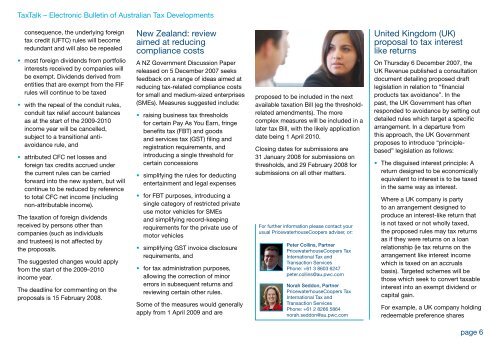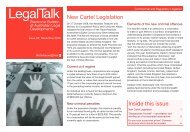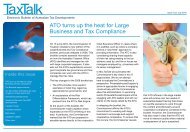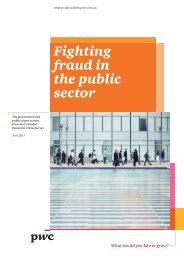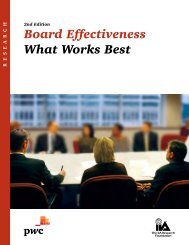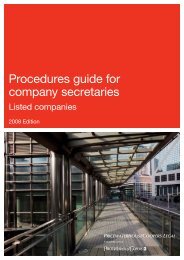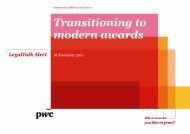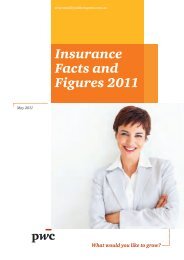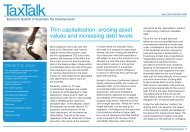Australian R&D tax incentives â another reason for ... - PwC
Australian R&D tax incentives â another reason for ... - PwC
Australian R&D tax incentives â another reason for ... - PwC
You also want an ePaper? Increase the reach of your titles
YUMPU automatically turns print PDFs into web optimized ePapers that Google loves.
TaxTalk – Electronic Bulletin of <strong>Australian</strong> Tax Developments<br />
consequence, the underlying <strong>for</strong>eign<br />
<strong>tax</strong> credit (UFTC) rules will become<br />
redundant and will also be repealed<br />
• most <strong>for</strong>eign dividends from portfolio<br />
interests received by companies will<br />
be exempt. Dividends derived from<br />
entities that are exempt from the FIF<br />
rules will continue to be <strong>tax</strong>ed<br />
• with the repeal of the conduit rules,<br />
conduit <strong>tax</strong> relief account balances<br />
as at the start of the 2009-2010<br />
income year will be cancelled,<br />
subject to a transitional antiavoidance<br />
rule, and<br />
• attributed CFC net losses and<br />
<strong>for</strong>eign <strong>tax</strong> credits accrued under<br />
the current rules can be carried<br />
<strong>for</strong>ward into the new system, but will<br />
continue to be reduced by reference<br />
to total CFC net income (including<br />
non-attributable income).<br />
The <strong>tax</strong>ation of <strong>for</strong>eign dividends<br />
received by persons other than<br />
companies (such as individuals<br />
and trustees) is not affected by<br />
the proposals.<br />
The suggested changes would apply<br />
from the start of the 2009–2010<br />
income year.<br />
The deadline <strong>for</strong> commenting on the<br />
proposals is 15 February 2008.<br />
New Zealand: review<br />
aimed at reducing<br />
compliance costs<br />
A NZ Government Discussion Paper<br />
released on 5 December 2007 seeks<br />
feedback on a range of ideas aimed at<br />
reducing <strong>tax</strong>-related compliance costs<br />
<strong>for</strong> small and medium-sized enterprises<br />
(SMEs). Measures suggested include:<br />
• raising business <strong>tax</strong> thresholds<br />
<strong>for</strong> certain Pay As You Earn, fringe<br />
benefits <strong>tax</strong> (FBT) and goods<br />
and services <strong>tax</strong> (GST) filing and<br />
registration requirements, and<br />
introducing a single threshold <strong>for</strong><br />
certain concessions<br />
• simplifying the rules <strong>for</strong> deducting<br />
entertainment and legal expenses<br />
• <strong>for</strong> FBT purposes, introducing a<br />
single category of restricted private<br />
use motor vehicles <strong>for</strong> SMEs<br />
and simplifying record-keeping<br />
requirements <strong>for</strong> the private use of<br />
motor vehicles<br />
• simplifying GST invoice disclosure<br />
requirements, and<br />
• <strong>for</strong> <strong>tax</strong> administration purposes,<br />
allowing the correction of minor<br />
errors in subsequent returns and<br />
reviewing certain other rules.<br />
Some of the measures would generally<br />
apply from 1 April 2009 and are<br />
proposed to be included in the next<br />
available <strong>tax</strong>ation Bill (eg the thresholdrelated<br />
amendments). The more<br />
complex measures will be included in a<br />
later <strong>tax</strong> Bill, with the likely application<br />
date being 1 April 2010.<br />
Closing dates <strong>for</strong> submissions are<br />
31 January 2008 <strong>for</strong> submissions on<br />
thresholds, and 29 February 2008 <strong>for</strong><br />
submissions on all other matters.<br />
For further in<strong>for</strong>mation please contact your<br />
usual PricewaterhouseCoopers adviser, or:<br />
Peter Collins, Partner<br />
PricewaterhouseCoopers Tax<br />
International Tax and<br />
Transaction Services<br />
Phone: +61 3 8603 6247<br />
peter.collins@au.pwc.com<br />
Norah Seddon, Partner<br />
PricewaterhouseCoopers Tax<br />
International Tax and<br />
Transaction Services<br />
Phone: +61 2 8266 5864<br />
norah.seddon@au.pwc.com<br />
United Kingdom (UK)<br />
proposal to <strong>tax</strong> interest<br />
like returns<br />
On Thursday 6 December 2007, the<br />
UK Revenue published a consultation<br />
document detailing proposed draft<br />
legislation in relation to “financial<br />
products <strong>tax</strong> avoidance”. In the<br />
past, the UK Government has often<br />
responded to avoidance by setting out<br />
detailed rules which target a specific<br />
arrangement. In a departure from<br />
this approach, the UK Government<br />
proposes to introduce “principlebased”<br />
legislation as follows:<br />
• The disguised interest principle: A<br />
return designed to be economically<br />
equivalent to interest is to be <strong>tax</strong>ed<br />
in the same way as interest.<br />
Where a UK company is party<br />
to an arrangement designed to<br />
produce an interest-like return that<br />
is not <strong>tax</strong>ed or not wholly <strong>tax</strong>ed,<br />
the proposed rules may <strong>tax</strong> returns<br />
as if they were returns on a loan<br />
relationship (ie <strong>tax</strong> returns on the<br />
arrangement like interest income<br />
which is <strong>tax</strong>ed on an accruals<br />
basis). Targeted schemes will be<br />
those which seek to convert <strong>tax</strong>able<br />
interest into an exempt dividend or<br />
capital gain.<br />
For example, a UK company holding<br />
redeemable preference shares<br />
page


